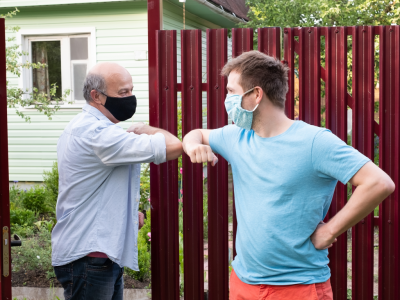
Getting Along: How to Build the Best Neighborhood Relationships
The past year has taught us a lot about seeking comfort in our homes. Now, as we begin venturing out, engaging more actively with others, and enjoying outdoor weather, it’s an excellent time to take a fresh look at getting along with the folks immediately beyond our four walls.
Plus, many people changed residences during the pandemic and are eager to get acquainted with their new neighbors. Here’s a quick refresher on making the most of neighborhood relationships.
Begin at the Beginning
Building good neighborly relationships starts when you or someone else moves into the area.
If you are a newcomer, find an opportunity to introduce yourself to the neighbors. Being proactive and friendly opens the door for future communication, and good communication will help prevent any minor issues from growing into more significant problems.
If a new neighbor moves in, be proactive and welcome them to the neighborhood. Be the first to stop by and say hello. Consider taking a plate of cookies or a small housewarming gift. Share your contact information and offer to answer any questions they may have about the community, including your favorite restaurants or the best local service providers.
Be a Good Neighbor
Throughout the year, there are numerous ways to encourage good relationships.
Be friendly. Smile and wave when you encounter neighbors. Be a pleasant addition to the neighborhood.
Maintain your space. Don’t create eyesores or allow your property’s condition to affect the value of neighboring homes adversely. Being kind to those around you includes keeping your yard tidy, shoveling snow from your sidewalks, and collecting trash and recycling bins after the truck has passed.
Be inclusive. If you are hosting a large cookout or party, consider extending invitations to your neighbors. During the holiday season, remember the folks next door with a card, a homemade goodie, or an offer of assistance. Give without strings or expectations. Let others know you are thinking of them.
Quell Conflicts
Sometimes tensions arise in life—and a neighborhood. Often, stressful situations boil down to poor communication, unintended insults, or turf issues. Most are avoidable or easily fixed if handled promptly.
Avoid Causing Rifts
Some neighbors are more easygoing than others, but the safest path is to steer clear of testing their patience.
Keep the noise down. Try to remember that your neighbor may not appreciate your favorite music, your boisterous children, a dog who barks incessantly, mowing your lawn at the crack of dawn, or hammering on shared walls at odd hours.
Park considerately. Try not to take up parking space in front of your neighbor’s house, especially when there is room at your own home. Encourage visitors to avoid inconveniencing the neighbors with their parking choices too.
Don’t be a gossip. Keep in mind that people will assume you talk about them in the same manner you speak about others.
Manage your dependents. Remember that your children and pets are not your neighbors’ responsibility. Try to keep them (and any messes they make) on your own property.
Employ the golden rule. If you borrow something, return it. If you break something, replace it.
Allow people to be human. Everyone has a bad day now and then, and it’s impossible to know what others are going through. Don’t be too quick to assume a slight is personal or intended.
Healing Rifts
If disputes arise, what are the best ways to patch things up?
Be responsible. If there’s an issue, do your best to discuss it face-to-face and calmly.
Own it. If you or yours caused a problem, apologize sincerely and take steps to ensure it won’t happen again.
Accept it. If you have tried your best to resolve a conflict without success, let it go. Sadly, some people won’t like you whatever you do. And you aren’t going to enjoy some people. It’s easier to accept it and move on. Be pleasant anyway, and be thankful that you get to live your life and they get to live theirs.
